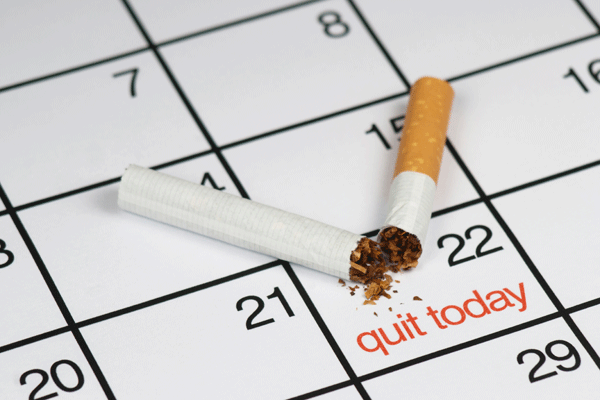If you smoke cigarettes, quitting is one of the most important things you can do to improve your baby’s health
When you smoke during pregnancy, your baby is exposed to nicotine, just one of 4,000 toxic chemicals in cigarettes that you can pass to your baby. Nicotine narrows your blood vessels and your baby gets less oxygen and nutrients through the placenta. Nicotine also can damage baby’s brain and lungs. Cigarette smoking doubles your risk of having a small baby, a baby born with birth defects such as a cleft palate, and increases the chance of preterm birth, that is giving birth more than three weeks early. Babies that are born too early may not be fully developed. Other risks include miscarriage, stillbirth and even an increased risk of sudden infant death syndrome (SIDS) once baby is born. Smoking during pregnancy doubles your risk of having a problem with your placenta. An example is placental abruption, where the placenta separates from the wall of the uterus, a dangerous complication for you and your baby. The risks of smoking during pregnancy go beyond problems in pregnancy. Children born to mothers who smoke during pregnancy are at an increased risk of asthma, colic and childhood obesity.
See also: Smoking, drinking alcohol and doing drugs can hinder your baby’s development
Secondhand smoke is also a threat
Even if you don’t smoke, secondhand smoke—other people’s smoke that you inhale—can increase the risk of having a low-birth-weight baby by as much as 20%. Small babies often have complications such as infections, trouble feeding and gaining weight, breathing problems and immature lungs. Babies exposed to secondhand smoke also have an increased risk of SIDS and are more likely to have asthma attacks and ear infections. If you work or live around smokers, take steps to avoid secondhand smoke. All secondhand exposure produced by cigarettes, e-cigarettes and vaping devices, cigars, hookah and marijuana are harmful to your health and your baby’s.
Never too late to quit smoking or vaping
Nearly 16% of women smoke during their pregnancies. Quitting smoking before 15 weeks of gestation will help you and your baby the most, quitting at any point in pregnancy can help.
E-cigarettes contain the same chemicals, like nicotine, that can harm both mom and baby. Flavors and other chemicals in e-cigarettes may also be harmful. Recently e-cigarettes (e.g., vaping) have been linked to serious lung complications. If you need help to quit, tell your nurse or provider. If staying smoke-free isn’t your goal, you may want to cut down rather than quit smoking altogether. It’s true that the less you smoke, the better for your baby, however quitting is best.
Make a quit plan
A quit plan is your personal plan to get ready to quit smoking. Visit smokefree.gov/build-your-quit-plan to get started. Here are some things to include:
- Decide on a quit day. On this day, throw away all your cigarettes or cigars, lighters and ashtrays. Choose a day within the next 2 weeks so you have time to get ready. Put the quit day on your calendar.
- List your reasons for quitting. Look at this list when you think about smoking.
- Know triggers that make you want to smoke. Triggers can be emotional, like wanting to smoke when you feel stressed or lonely. Knowing what your triggers are can help you learn ways to manage them so you don’t need to smoke.
- Plan ahead for ways to deal with cravings. For example, what can you do instead of smoking when you have a craving to smoke?
- Get rid of smoking reminders, like matches and ashtrays. Wash your clothes and clean your car.
- Make use of tools to help you quit.Use apps and quitlines. gov has a free text message program for pregnant women who are trying to quit. It also has a free app you can download to keep you on track. Call 1-800-QUIT-NOW for advice from a quit smoking counselor. Look for programs in your community or where you work, called smoking cessation programs, that can help you stop smoking.
- Tell your family, friends and loved ones about your plan to quit smoking. They can help support you.
Smoking Cessation Resources
- National Alliance for Tobacco Cessation (becomeanex.org/pregnant-smokers.php)
- The American Cancer Society (cancer.org/quitsmoking)
- March of Dimes (marchofdimes.org/pregnancy/smoking-during-pregnancy.aspx)
- National Institutes of Health (smokefree.gov and 1-800-Quit-Now)
- Centers for Disease Control and Prevention tips for quitting smoking (CDC.gov/quit)
By Roberta F. Durham RN, PhD and Diana Cortez RN, BSN
Roberta F. Durham RN PhD is Professor Emeritus at California State University, East Bay and Diana Cortez RN BSN is a staff nurse at the University of California, Davis Medical Center.






Comments are closed.